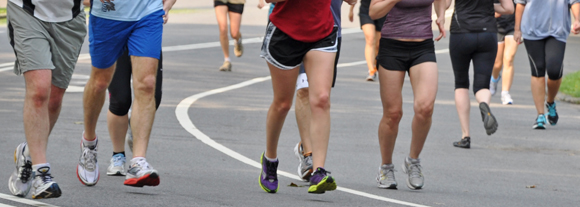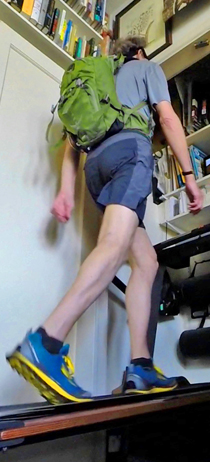December 22, 2014. I’m gonna have a little more to walk off this week than usual. If you might have a bit more, too, here’s something you might like to know about that walking-it-off pace. That “brisk” pace.
I always thought “brisk” must be about 3 miles per hour or faster – because that’s a pace that’s a little faster than casual-social-window-shopping walking for most people. And that’s the pace I use when I do the math to tell you that 25 minutes of brisk walking burns all 134 calories in a serving of that luscious Portobello Mousse. So I thought you’d want to know about a recent study that provides a very specific definition of “brisk”.
Public Library of Science published this report, “The Relationship of Walking Intensity to Total and Cause-Specific Mortality”. Here’s the conclusion: “The risk for mortality: 1) decreases in association with walking intensity, and 2) increases substantially in association for walking pace ≥24 minute mile (equivalent to <400m during a six-minute walk test) even among subjects who exercise regularly.“
Translation: if it takes you more than 24 minutes to walk a mile (that’s a speed of less than 2.5 mph), your exercise benefit is relatively small. If you walk faster, the benefits are significantly greater.
How much faster? Doesn’t seem to matter much. The study subjects who walked a moderately brisk 3 mph, a very brisk 3.75 mph and a race-walking 4.5 mph all benefitted similarly in terms of reduction in risk for premature death, cardiovascular disease, diabetes and dementia. Compared to the slower-walking group, their “all causes” risk was 44% lower. And much lower for dementia.
So if you can pick up the pace a bit, there’s a real benefit. But if you can’t … don’t. There’s still a huge benefit from walking at any pace compared to doing nothing. You still burn calories, for example; it just takes a little longer. In fact, if you feel you can’t pick up the pace beyond 2.5 mph, this new study suggests you see your doctor for a thorough checkup. You may have a cardiovascular or other problem that limits your walking pace. And if you’re over 70, this study may not apply to you: the subjects were mostly 40 – 65.
All things in moderation
When it comes to walking, moderately brisk (3 – 3.5 mph) is just as beneficial as crazy-fast-brisk (4.5 mph). When it comes to running, a moderate pace may be better than a fast one.
The most recent report from the ongoing, long-term Copenhagen City Heart Study has this great headline: “Regular jogging shows dramatic increase in life expectancy.” How dramatic? Six years of extra life. 6.2 more for men who jog; 5.6 more for women who jog. Compared to men and women who don’t jog. How regular? Between 1 and 2.5 hours per week.
How fast? Slower, actually. The participants who reported their pace to be “slow” or “moderate” show the greatest increase in longevity. The study’s lead researcher, Dr. Peter Schnohr, says this about jogging Slower: “Mortality is lower in people reporting moderate jogging, than in non-joggers or those undertaking extreme levels of exercise … You should aim to feel a little breathless, but not very breathless”. You can read more about this here.
So when you’re out there walking off those holiday meals, see if you can pick up the pace. Just a little. If you’re out running them off, take it easy. Whichever Way you do it, eat well and have a very moving holiday.
‘Tis the season to be jolly
“Although previous studies have found enhanced mood for up to an hour after exercise, this study found benefits for up to 12 hours following activity, compared to the resting group…Test subjects performed exercise at 60 percent of aerobic capacity, indicating that moderate-intensity exercise – like walking or light cycling – is enough to boost mood.” American College of Sports Medicine
Every Thing Is Everything
“Walking is the best possible exercise. The object of walking is to relax the mind. You should therefore not permit yourself even to think while you walk. But divert your attention by [appreciating] the objects surrounding you. Habituate yourself to walk very far.”
– Thomas Jefferson
It’s Always Something
“It does not matter how slowly you go so long as you do not stop.” – Confucius
I guess he was speaking metaphorically, not medically.

